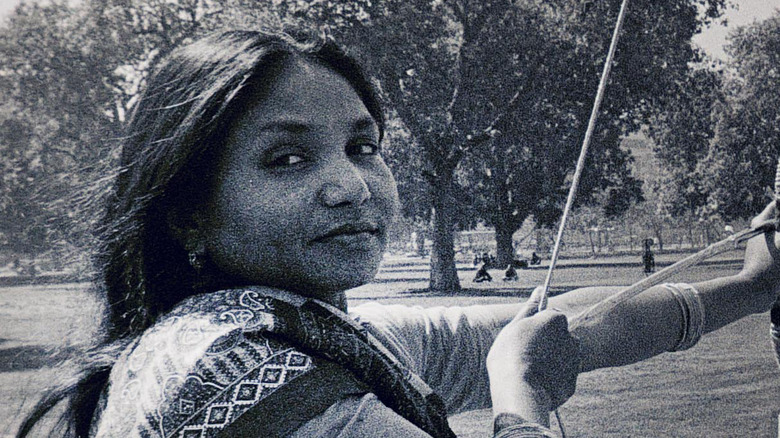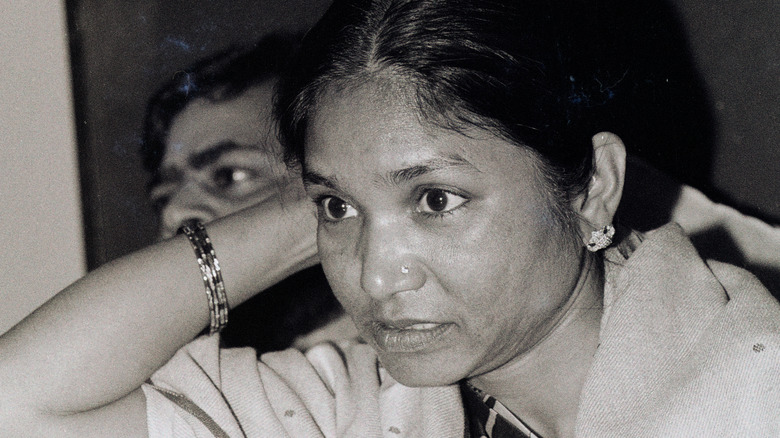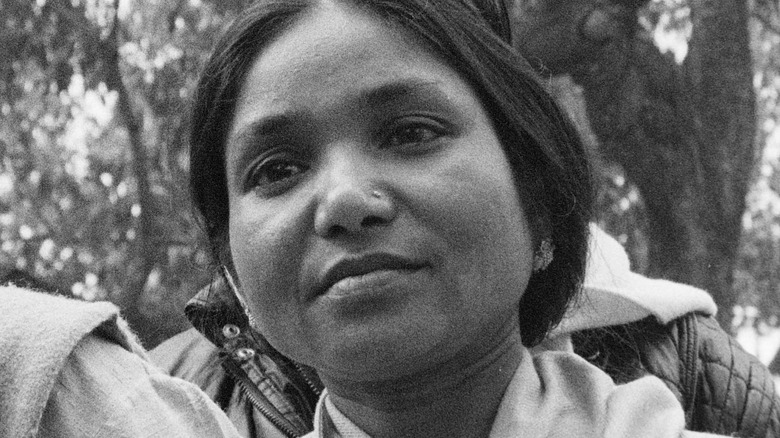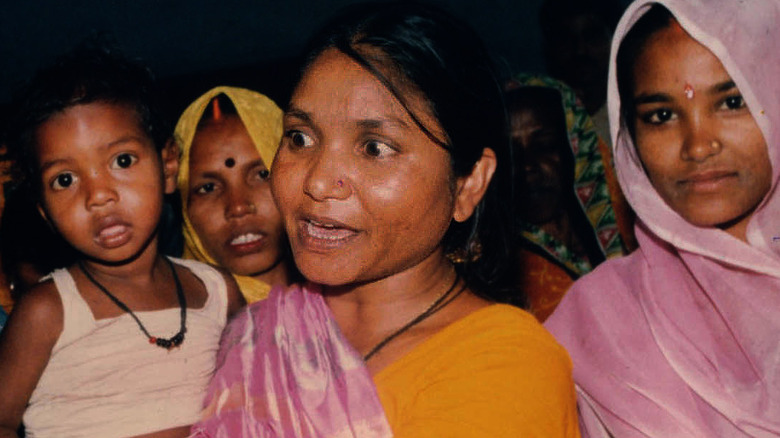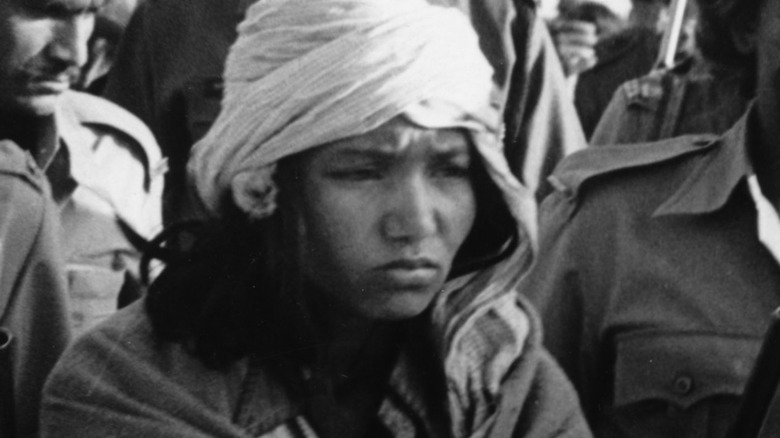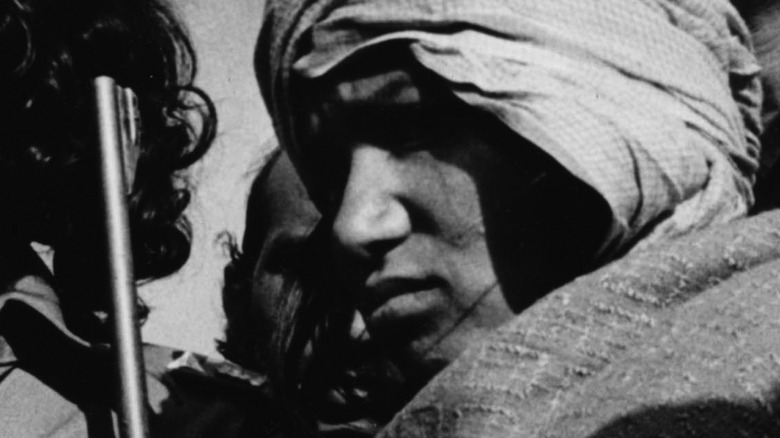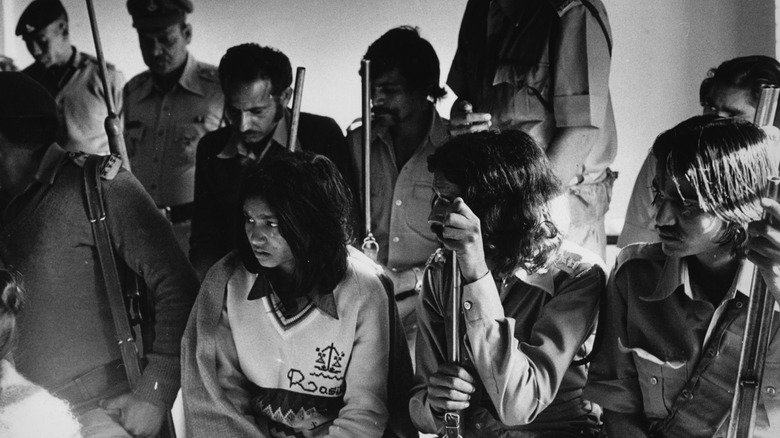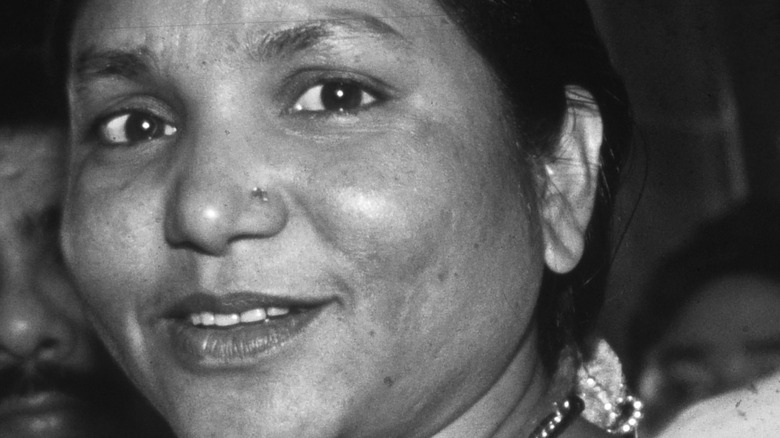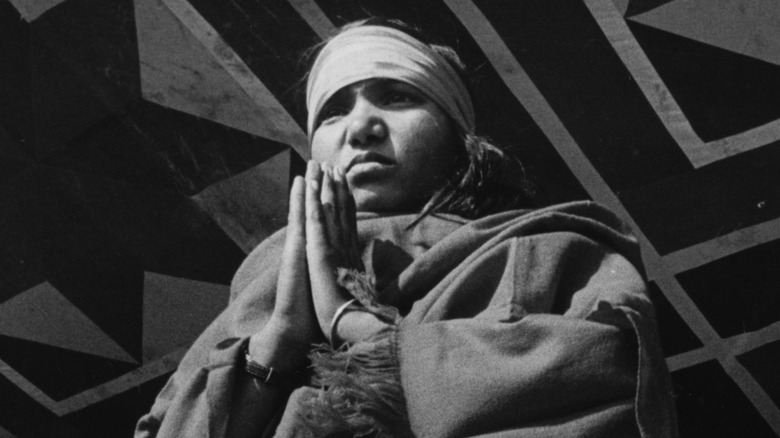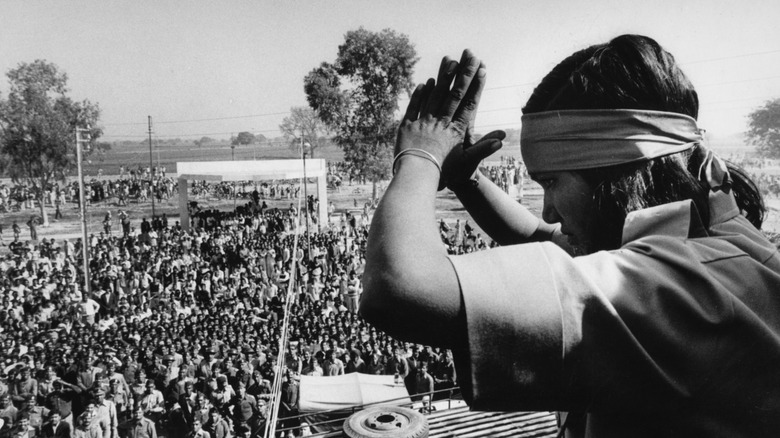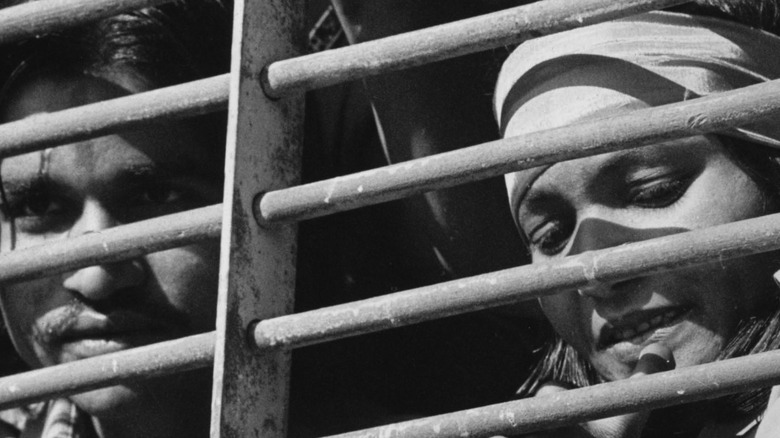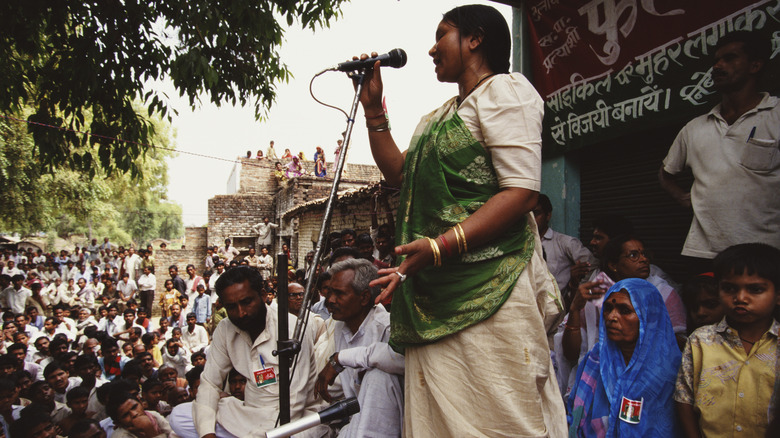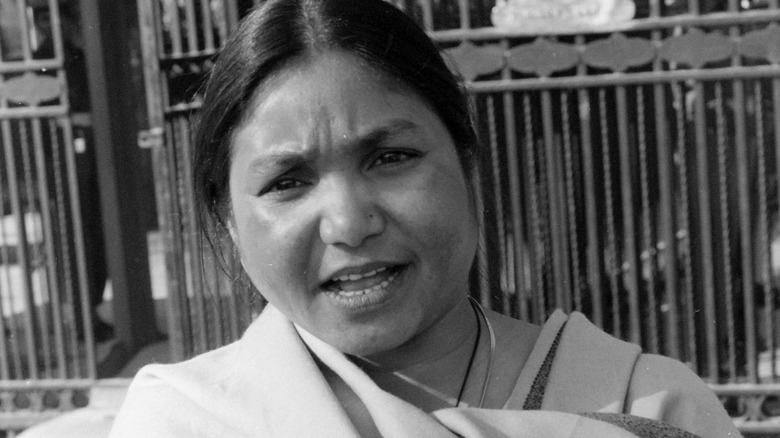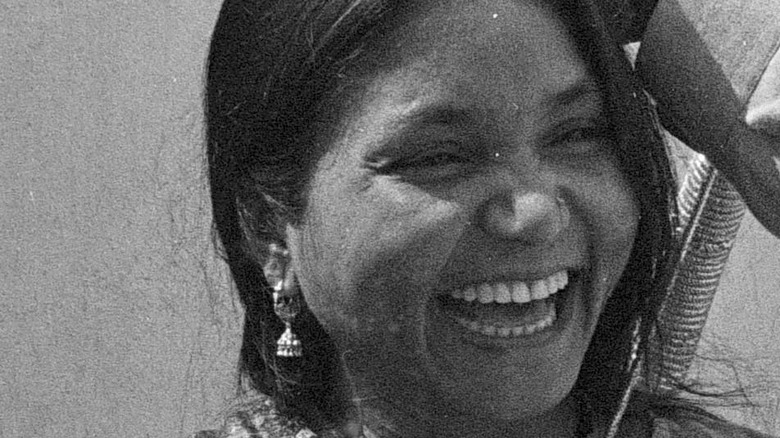India's Bandit Queen: The Tragic Life And Assassination Of Phoolan Devi
The following article contains descriptions of violence, including sexual violence.
Bandit Queen. Rebel of the Ravines. Avenging Angel. These were all nicknames for one of India's most famous and controversial figures: Phoolan Devi. Devi was seen as a murderer by some and a hero by others, and her story has captured the imagination of people around the world for forty years.
To many, both her life and death have been viewed as symbolic of the cycle of violence fueled by a desire for justice and revenge between people from upper and lower castes. Phoolan Devi described her time as a bandit as her happiest years and considered getting revenge to have been the greatest joy of her life. In an interview in The Atlantic, Devi stated that once she became a dacoit, she began going after people who had tortured and abused her.
As a child, Devi faced devastating poverty and abuse. As an adult, she got her revenge and rose to legendary status as an outlaw. At different times in her life, she was a wanted woman, a gang leader, a folk hero, and a politician fighting against oppression.
Her family lived in extreme poverty
Phoolan Devi's family faced extreme hardship: They worked constantly and barely had enough to sustain themselves. There were times when Devi's parents feared that they and their children would starve. They lived in a small village in Northern India. Her family has nearly torn apart over a dispute between her father and wealthy cousin over a small plot of land, which they believed could be their only means of survival.
In her autobiography, "The Bandit Queen of India," Devi explains that the horrors her family had to endure did not come about by coincidence. They were certainly living in extreme poverty, but that poverty was enforced by an ancient hierarchy. From the day she was born in 1963, Phoolan Devi's life was dictated by the caste system: A social hierarchy that dates back more than a thousand years.
Although its original religious meaning was different, the caste system became a codified class system that defined a person's occupation and social status based on the role their parents had. Devi's family were members of the Mallah caste, a sub-group of boatmen within the Sudra caste, which is traditionally a low caste made up of laborers.
She was sold into marriage as a child
Despite the many challenges her family faced, Phoolan Devi was described as a fun-loving child who was quick to laugh (via "India's Bandit Queen"). When she was 11 years old, her uncle arranged a marriage for her against her mother's wishes.
Devi was betrothed to a man who was around thirty years old. He offered Devi's family the modern-day equivalent of about $80, a bicycle, and a cow in exchange for forcing Devi to marry him. The only person in the village who spoke out against the marriage publicly was a woman who people believed was "mad."
Originally, it had been agreed that Devi would not be forced to leave her home and her family for three years, but within just a few months, the man arrived and insisted on taking Devi back to his house. Her mother wept when her daughter was taken but let her go. In an interview with Devi's biographer, her mother stated that the difficulties of poverty drove them to arrange the marriage.
If you or someone you know may need help leaving or resisting a forced marriage, please contact Unchained at Last at (908) 481-HOPE. You can also find more information, resources, and support on the website.
Her first husband was abusive
Not only was Phoolan Devi forced into a marriage with a stranger while she was only a child, but the man she married also turned out to be cruel and violent (via "India's Bandit Queen"). She was terrified of him and resisted any sexual advances he made, which only made him more violent towards her, as described by Devi in her diaries, which were later published. Her new husband was insulted that the child he had forced into marriage did not like him.
When Devi was around 13, she became sick with the measles, and her husband insisted that her father come and get her and then pay a large sum of money for him to take her back. Her family was devastated because they knew they couldn't afford to pay, but they also couldn't afford to feed and care for their daughter at home. Devi's mother told her sick daughter that she would be better off dead than rejected by her husband and unwanted in her parents' home.
If you or someone you know is dealing with domestic abuse, you can call the National Domestic Violence Hotline at 1−800−799−7233. You can also find more information, resources, and support at their website.
Ruined crops sent her to jail
Although Phoolan Devi's family had very little, they did have a beloved berry tree on their small property, which had been planted by Devi's great grandfather. In her autobiography, Devi explained that her father was considering cutting down the old tree in order to sell the wood, which would be worth a significant amount. Before they could, however, Devi's wealthy cousin stole the tree.
Devi had been fighting back against her cousin since she was a young child. She would insult him or organize others to sit on his land in protest. Often, he responded with violence. According to "India's Bandit Queen," the conflict between Devi's father and her cousin had escalated. When Devi was twenty-one, the family discovered that Devi's cousin had intentionally destroyed the family's crops, which was a devastating blow.
Shortly after, Devi awoke to discover that her cousin and his friends were chopping down the berry tree. Devi tried to protect her family's property by throwing rocks and mud at her cousin. Her cousin and his friends attacked her and tried to force her away from the cart they were using to haul away the tree, but she wouldn't back down.
Although he had stolen the tree, her cousin reported her to the police and then encouraged all of his friends to testify against her in court. Devi told her biographer that she was beaten and mocked by the police. She spent a month in jail.
Devi lived with outlaws
Dacoits, or armed bands of criminals, were a known threat in parts of northern and central India. Although these bandits often attacked unwary travelers, dacoits were often folk heroes. Like American bank robbers in the 1930s, the public often thought of dacoits as romantically misunderstood figures.
Phoolan Devi became involved with a gang of dacoits less than a year after being released from prison. The details are unknown because Devi herself recounted several different versions of the event throughout her life. Some believe that Devi was kidnapped by the gang's brutal upper-caste leader, Babu Gujar, while others believe that she sought out the bandits intentionally, looking for a new life.
It is believed that the bandit leader, Babu Gujar, violently assaulted Devi. A lower-caste member of the gang named Vikram was so appalled by Gujar's treatment of Devi that he shot him. Vikram assumed control of the gang, and Devi remained with the bandits. Soon, she would be their leader.
Devi became the Bandit Queen
Some versions of the story state that Vikram had been secretly interested in Phoolan Devi for years. Whether this is true or not, it is known that he and Devi became a couple and ran the gang together. It is believed that they had a passionate romantic relationship, and he taught her how to thrive as a dacoit. She became an excellent shot, an imposing leader, and a folk hero.
Soon, Devi was known as the "Avenging Angel," "rebel of the ravines," and most famously, the "Bandit Queen." Devi believed that she had the ability to predict the future by interpreting events around them, like the appearance of a snake or a crow, as an omen, and the outlaws came to rely on her intuition and fortune-telling to evade capture by the authorities.
Devi and her partner led their gang to raid upper-caste villages, hold up trains, rob travelers, and kidnap and ransom wealthy people. On many occasions, the gang is believed to have killed those unfortunate enough to meet them. Among the places they targeted was the village of the man that she had been forced to marry when she was just 11 years old. It is believed that Devi took her revenge on the man who had abused her, leaving him with permanent scarring.
She was attacked and her lover was killed
The following section includes an account of sexual violence.
Phoolan Devi's time ruling the gang as a bandit queen alongside her partner Vikram would only last one year. As Devi described in "India's Bandit Queen" her intuition told her that something was wrong. She tried warning Vikram that the other members of the gang were acting strangely, but he didn't believe her.
That night, some of the gang led a rebellion, shooting Vikram and those loyal to him. There have been different accounts of what happened next, but what is known for certain is that the men who had killed Vikram abducted Devi and forced her to go to a predominantly upper-caste village called Behmai.
In Behmai, she was tortured, assaulted, raped, and humiliated while the people there, who Devi did not know, celebrated the death of her partner. She was held captive for more than three weeks. Devi later explained that she only survived because a priest from a village near Behmai helped her to escape, giving her a gun and the key to the room where she was being held. As she fled, she swore she would get revenge on the people of Behmai, both for what they had done to her and for killing Vikram.
She led a massacre
On Valentine's Day in 1981, it appeared that some police officers were arriving in Behmai. The deputy superintendent was a woman in her twenties. She was stylish and feminine, with bright lipstick and nail polish. Her look struck the people of Behmai as unusual, and for good reason: She was not a police officer. She was Phoolan Devi. She had returned to the village of Behmai less than two years after being captured and tortured there. This time, she was looking for revenge.
After her escape, Devi had formed a new gang of outlaws. When they arrived in Behmai, her men blocked the exits, trapping the villagers. What would follow is known as the Saint Valentine's Day Massacre. While her men went through the village house by house, stealing anything of value inside, Devi violently questioned people in the town square.
She ordered them to bring out the men who had kidnapped her or suffer the concequences. Around 50 upper-caste men from Behmai were led out of the village. Twenty-two were forced to their knees and executed by Devi's gang.
Devi was the most wanted woman in India
Devi was wanted on 55 different criminal charges, including murder and kidnapping. The Prime Minister of India ordered a massive police operation to attempt to capture Phoolan Devi and the rest of her gang. They managed to evade capture for two years, and every day that Devi walked free, her fame grew.
The romantic idea of dacoits as rebels living outside of society's rules was exemplified by the legend of the "Bandit Queen of India." Stories about her beauty, ferocity, and love affairs became incredibly popular. The massacre had shocked the nation, not only because of the extreme violence but because it had been committed by a lower-caste woman against upper-caste men.
While the massacre had made her a wanted woman, it had also made her a legend. Devi became a symbol of rebellion against oppression. By the time Phoolan Devi had to surrender, she was a living legend. This gave her the power and influence to negotiate a surrender on her own terms.
She went to prison for 11 years
While Phoolan Devi was implicated in dozens of crimes, including murder and kidnapping, she was able to negotiate a deal for herself and her men. She was also able to negotiate a surrender that served her interests and only made her more famous.
The surrender was scheduled for Valentine's Day, 1983, the two-year anniversary of the infamous massacre. The event was designed to generate public excitement, and it did. Alongside the 300 police officers that were there to ensure that Phoolan Devi came quietly, more than 7,000 spectators flocked to the village of Bhind to see the Bandit Queen surrender. Journalists from all around the world attended. After the extravagant public ceremony, Devi and her men were taken into custody.
As detailed in "India's Bandit Queen," Devi had made a deal that ensured that she and her men would serve time in prison, but none of them would be hanged. She negotiated that they would receive fair treatment while in prison and that they would serve no more than eight years. She was also never formally charged with the murders in Behmai village.
Devi became a controversial politician
Although Phoolan Devi had negotiated a deal that no one in her gang would spend more than eight years in prison, she herself was held for 11 years (via The New York Times). It wasn't until a lower-caste Chief Minister was elected in Uttar Pradesh that charges against Devi were dropped, and she was released. After her release, Devi traveled around India alongside lower-caste political candidates. Devi declared that she would work towards uplifting the lives of women and the downtrodden.
Just two years after being released from prison, Devi herself became a politician. From the beginning, her political career was highly divisive. When she arrived in lower-caste villages, she was hailed as a hero, but in upper-caste neighborhoods, she sometimes faced protests, often organized by the family members of the men she had killed. On several occasions, opponents started fires, dug up roads, and even shot at Devi in an attempt to keep her away. Still, she was a hero to lower-caste women, who made up a vast majority of the voters. She became a member of Parliament.
She was assassinated
On July 25, 2001, Phoolan Devi had just returned to her home in Delhi after a morning in Parliament. Three assassins were waiting for her outside her home. Her bodyguard was injured, and Devi herself was shot in the head. She died almost instantly. At the time of her death, Devi was an elected member of parliament, a hero and champion of lower-caste Indians, and had more than 70 criminal charges against her pending, including murder.
According to The New York Times, speculation at the time was rampant. Some believed that she had been killed by people from the village of Behmai, seeking revenge for the massacre that had occurred 20 years before. Others suspected that her death was a political assassination designed to prevent the radical lower-caste candidate from being reelected.
It has since been determined that both theories had elements of the truth. A group of three upper-caste men plotted the attack on Devi as an act of revenge. In 2014, the man who shot Devi was sentenced to life in prison. In 2016, he was released on bail.
Her legacy remains complex
Few figures have been as divisive as Phoolan Devi. She was one of the few women to become famous as a dacoit leader, and her time as India's Bandit Queen made her a legend. The controversy around her was only compounded by her own tendency to elaborate and self-mythologize even the most lurid details of her life and career.
To some, she was an avenging angel and a champion of the oppressed, particularly women and people from lower castes. To others, her violent past made her a monster. She used both perspectives to her advantage, courting controversy and growing in infamy throughout her life.
In Devi's autobiography, "The Bandit Queen of India," she wrote that she hoped that hearing her story would help people who were being exploited and abused. She hoped that those who learned about her would see her as a human being and extend that same respect and empathy to others who are being oppressed. Her account instructed people to speak of her deeds, forgive her mistakes, and bestow her with peace.
